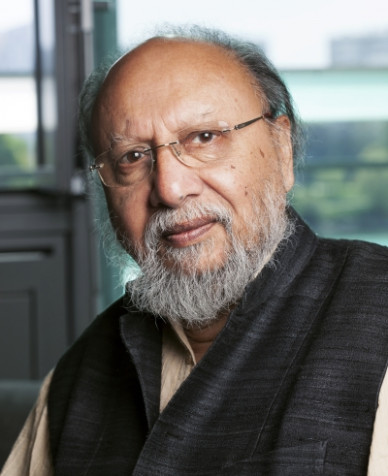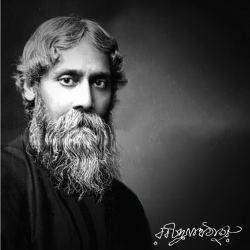 We are thrilled to announce that internationally renowned psychologist, psychoanalyst, sociologist and co-founder of postcolonial studies, Dr. Ashis Nandy, is the Tagore Visiting Scholar for 2023
We are thrilled to announce that internationally renowned psychologist, psychoanalyst, sociologist and co-founder of postcolonial studies, Dr. Ashis Nandy, is the Tagore Visiting Scholar for 2023
Dr. Nandy will lead the Tagore Program's second Spring Institute. The five sessions (on Mar 9, 13, 16, 20, and 23) are closed to the public however the opening Tagore Program Visiting Scholar Lecture by Dr. Nandy, on Mon, Mar 6, 2023, from 7:30-9 p.m. PST on Zoom, is open to all.
SCHEDULE OF SEMINARS
(Click titles for recordings)
- Mon, Mar 6: Tagore Program Visiting Scholar Lecture: Rabindranath’s Discovery of Gandhi
- Thu, Mar 9: Rabindranath in Public life I
- Mon, Mar 13: Rabindranath in Public Life II
- Thu, Mar 16: Tagore's Memories of Fearsome Urban-Industrialism Return
- Mon, Mar 20: Tagore's Worldview becomes Full-Fledged Dissent
- Thu, Mar 23: Tagore and Violence
READINGS
- Crisis in Civilization by Rabindranath Tagore (link to e-book)
- Rabindranath Tagore: A Biography by Krishna Kripalani (link to e-book)
- Seminar, vol 623, July 2011. Ed. Ananya Vajpeyi | The Nation and its Poet: A symposium on Rabindranath Tagore 1861-1941 - Life, Language, Legacy (link to online copy of the journal)
- On Tagore: Reading The Poet Today by Amit Chaudhuri (link to purchase e-book)
- Young Tagore: The Makings of a Genius by Sudhir Kakar (link to purchase e-book)
- The Black Man's Burden: Africa and the Curse of the Nation-State by Basil Davidson
BASICS
- Dates: Mar 6-23, 2023
- Location: Institute for South Asia Studies, UC Berkeley (via Zoom)
- Application Deadline: February 22, 2023
- Participants: Graduate and advanced undergraduate students. Capped at 30.
- Primary Audience: UC Berkeley students will be prioritized
- The course is free for participants.
- The final lecture is free and open to the public.
EXPECTATIONS & PROGRAM DETAILS
- This program will be an intensive dive into Rabindranath Tagore Studies. In order to foster a rich, engaging, accessible program, participants will be expected to attend all sessions, complete all program readings in a timely manner, and actively participate in the discussions
- At the conclusion of the program, each participant will be expected to complete a program evaluation.
- A Certificate of Completion will be issued by the Institute for South Asia Studies upon successful completion of the Spring Institute.
Click HERE to apply
The Spring Institute has been made possible in part by a major gift by Drs. Maya and Sakti Das.
 Ashis Nandy, sociologist and clinical psychologist, has over the years strayed into areas outside formal social sciences and normal academic concerns. His research interests centre on the political psychology of violence, cultures of knowledge, utopias and visions, human potentialities, and futures. Presently he is working on genocide. The running themes in his work have been concern and respect for marginalized categories and systems of knowledge and a robust scepticism towards expert-driven, packaged, professional solutions to human problems.
Ashis Nandy, sociologist and clinical psychologist, has over the years strayed into areas outside formal social sciences and normal academic concerns. His research interests centre on the political psychology of violence, cultures of knowledge, utopias and visions, human potentialities, and futures. Presently he is working on genocide. The running themes in his work have been concern and respect for marginalized categories and systems of knowledge and a robust scepticism towards expert-driven, packaged, professional solutions to human problems.
Nandy's books include Alternative Sciences, At the Edge of Psychology, The Intimate Enemy, The Tao of Cricket, The Illegitimacy of Nationalism, The Savage Freud and Other Essays in Possible and Retrievable Selves, An Ambiguous Journey to the City, The Romance of the State and the Fate of Dissent in the Tropics, Time Warps, Time Treks, and Traditions, Tyranny and Utopias. He is also a co-author of The Blinded Eye: 500 Years of Christopher Columbus and Creating a Nationality; editor of Science, Hegemony and Violence and The Secret Politics of our Desires; and a co-editor of The Multiverse of Democracy and The Future of Knowledge and Culture: A Twenty-First Century Dictionary.
Nandy is a Distinguished Fellow of the Institute of Postcolonial Studies, Melbourne, and a member of the Global Scientific Committee for Higher Education (UNESCO). Over the years, he has been also associated with initiatives such as the Centre for Ecology and Food Security, New Delhi; People’s Union of Civil Liberties, the Committee for Cultural Choices and Global Futures, Delhi; Commonwealth Human Rights Initiative, and the Intercultural Institute of Montreal.
Nandy received the Fukuoka Asian Culture Prize in 2007 and was chosen one of 100 top public intellectuals in the world in 2008. He received the Hans Killian Award in 2019.
Please email Puneeta Kala at pkala@berkeley.edu if you have any questions.

